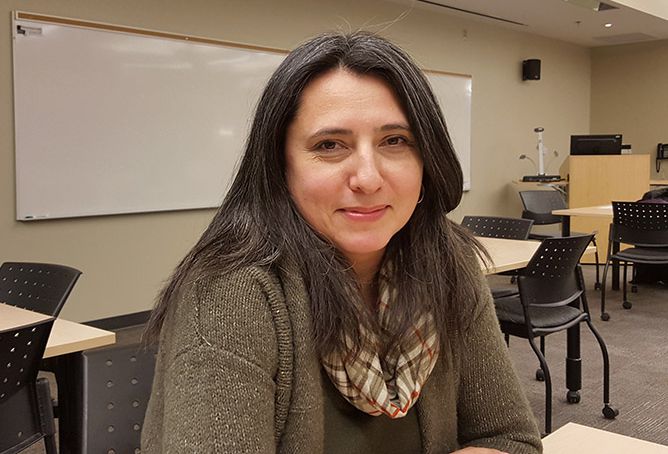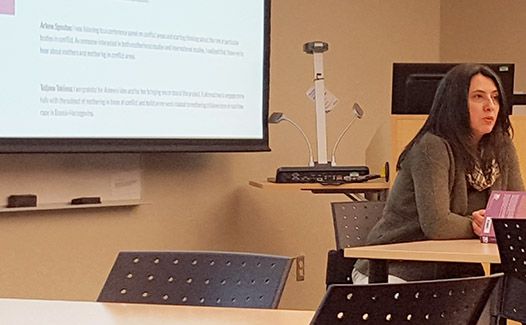Needs of women refugees not being met, says prof
Book explores mothering in conflict areas and how displacement affects women and families

caption

caption
Tatjana Takševa presented her book Mothers Under Fire at Saint Mary’s University Wednesday. The lecture was part of the Faculty Author Series.For women living in areas of conflict, being a mother is sometimes challenged by a battle to survive.
While Syrian refugees, among which are included mothers, continue to arrive in Nova Scotia, a Saint Mary’s University professor is highlighting a lack of attention paid to the needs of mothers in aid camps.
English professor Tatjana Takševa says the needs of women can include hygiene products, counselling, cash assistance and even the creation of safe spaces for discussion regarding problems they are facing, such as daycare options for their children.
Most mothers’ concerns are pragmatic and revolve around such issues as “‘Do I have enough money to support myself and my family in a very basic sense?’,” she said.
Takševa is co-author and editor of the recently released book Mothers Under Fire: Mothering in Conflict Areas. She spoke at a Faculty Author Series about how the book uses independent case studies to explore the loss of independence, exposure to violence and subsequent displacement of mothers in areas of conflict, such as Syria.
Barriers faced by women
Takševa says often what is meant as help by aid agencies set up in refugee camps actually goes against traditional cultural values and causes stress when the culture of the mother is not fully understood.
“The types of help that (are) offered to the mother will often actually stand in conflict with the values that the mother has about how she’s supposed to mother,” she says.

caption
Takševa says all aid workers should be well-versed in the language and the culture of the mothers and other individuals they are providing aid to.
The fix could be as simple as ensuring people are present who understand their language and culture.
Daycare is another important need that has to be met, according to Takševa, so that mothers can take the time to voice their concerns.
“Providing immediate daycare solutions for the mothers in camps [allows them to] take language classes. If the mother doesn’t have the ability to communicate and express her concerns, that is a significant barrier in what help she might receive,” she says.
Many experts agree that language barriers are often the biggest challenge facing refugees and refugee mothers.
Dr. Ingrid Waldron, assistant professor of Nursing at Dalhousie University, has researched discrimination against immigrants and refugees in the health-care system. She says workers trying to help these people often don’t understand their spoken language or their body language.
“There is often no one to interpret the message they are trying to express,” says Waldron. “And even when someone does understand the language being used, they don’t always understand the culture, and a lot can be missed.”
Takševa agrees with this. She says refugee women often wonder “’Am I being understood as a unique individual with my cultural beliefs in this new environment?’”
She says both needs have to be understood and taken seriously, so that effective help can be provided.
Impact
Takševa hopes the readership of this book extends beyond the public and educational institutions, though its audience is primarily academic.
She says the book is also intended to offer ways to institute change to policy makers who work directly with mothers in conflict areas.
“If the safety and well-being of women and children in areas experiencing conflict are indeed priorities for international government agencies and NGOs, then considering the particular roles and responsibilities of those who do the work of mothering is of crucial importance,” she says.
The conclusion of the book provides recommendations to these groups on policy changes that could affect real progress.
Takševa says small steps should be taken in refugee camps in Syria to begin to institute change, and that camps should start by diversifying their aid staff.
“All humanitarian services delivered in refugee camps should ensure aid comes from women as well as men and that it reaches both women and men,” she said.
What is next for her
The work doesn’t end here for Takševa.
She is working on two projects which further discuss her research relating to Bosnian mothers with children resulting from wartime rape.
Both projects reflect the same feminist viewpoint as the book. Takševa says feminism is largely a Western concept, but that it has become more flexible than many people think.
“I still see it as a robust movement … that speaks directly to issues that are relevant to groups that are not necessarily completely identifiable with white, middle-class feminism,” she says.

J
Jeanette